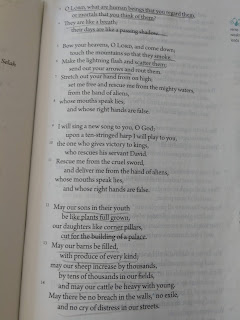Observation: Psalm 119 is the longest psalm by far (and the longest book of the Bible). Depending on how many essays and footnotes you've got in your Bible, there's a good chance if you open it smack in the middle, you'll find yourself somewhere in Psalm 119. And the whole thing is a love song devoted to God's law. The verse today that really has grabbed me and won't let me go is: "I shall walk at liberty, for I have sought your precepts." We tend to think of liberty as the absence of rules and regulations. But the psalm writer insists that there is a deeper freedom in choosing to seek God's way, intentionally, each day.
Application: Free will is a blessing and a curse. It's nice on paper to know we can make choices, but then there's the whole part where we have to take responsibility for them. It's cool, at first, to know that our actions have an impact on the world around us. But then, there's the part where our actions do actually, you know, have an impact. On the world around us. This gets intimidating. You can go down the rabbit hole of the "butterfly effect," where a butterfly flapping its wings on one side of world, by a chain of cause and effect, can create a tsunami elsewhere. If a butterfly can do that, then what consequences, intended and unintended, might my choices have? Like I said, freedom is a blessing and a curse. That's why I resonate with Psalm 119:45, where the psalmist finds liberty in seeking God's commandments. To have a guide, even if we don't always follow perfectly, is so much better than being adrift. To have Jesus' greatest commandment in mind, loving God above all and loving my neighbor as myself, sets me free from the constant worry and doubt about the impact I'm having. Sure, I will often fall short. And even more often, there will be unintended consequences of what I think of as love for my neighbor. But those consequences can bring lessons in themselves. And in the meantime, there is grace.
Prayer: God, thank you for your law, which shows me the way to go, and reminds me I can never do it perfectly. Help me to treasure it, for it continually drives me back to you. Amen.












